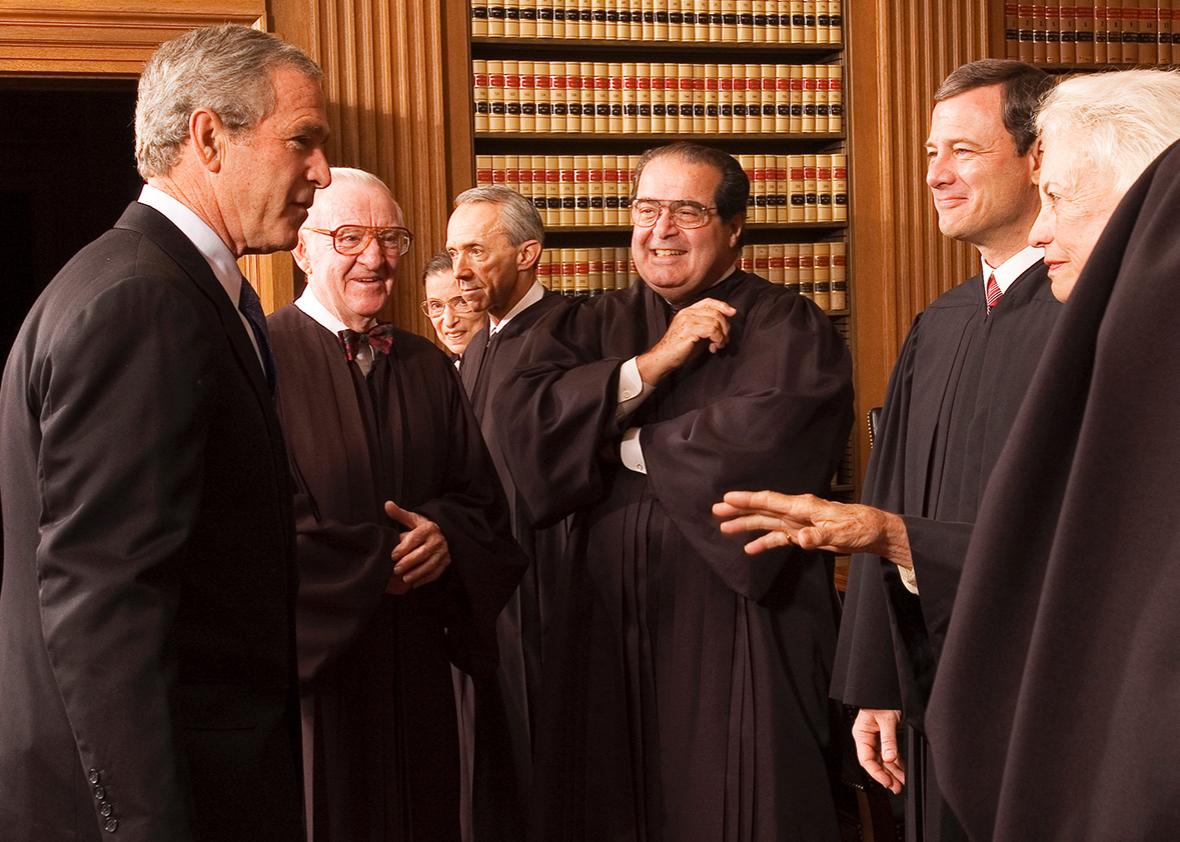Justice Antonin Scalia’s death had barely been announced before the fight over his potential successor began to reach a fever pitch. Republicans are saying that there shouldn’t be another appointment until the next president is in office. Democrats, meanwhile, are arguing that the Republican-controlled Senate has a constitutional responsibility to consider Obama’s appointment. On Monday, Democratic front-runner Hillary Clinton made the strongest such statement, accusing these Republicans of “ignoring the Constitution” and turning their backs on Scalia’s legacy of originalism, the theory of constitutional interpretation that requires adherence to the original meaning of the constitutional text. So what does fidelity to the Constitution require? And does originalism have anything to say about it?
It’s actually a tricky question. There is no reason for an originalist to oppose an Obama nomination on constitutional grounds. But there’s also no constitutional obligation for the Senate to approve a presidential pick.
First off, there is nothing in the Constitution that provides a time limit for presidential nominations to the Supreme Court. The founders could have decided that presidents should not nominate late in their term or at all when an election was imminent. But they could not have contemplated the structure of the modern presidential election, with its endless campaigning or its presidential term limits. So, too, the Constitution has nothing at all to say about lame ducks or even what specific role—beyond an up or down vote—the Senate should have in approving nominees to the high court.
And so one has to ask: On what theory of constitutional interpretation do Sen. Ted Cruz and other avowed originalists maintain that the president should not put forward a nomination—and that the Senate should not consider it—in an election year? Their argument, as far as I can tell, is that it is anti-democratic for a sitting president in his final year to make an appointment to the court when an election is right around the corner. Why, though? Obama was duly elected three years ago; presumably the citizenry anticipated he would make nominations throughout his term in office. And there is nothing anti-democratic about the Senate taking up the nomination or about senators who are also up for re-election voting on that nomination.
Maybe a plausible argument could be made that the sitting president and the sitting senators aren’t really representative of the current citizenry because they were elected a number of years ago. According to this argument, institutions should wait for a new election to make any big decisions—as waiting would better reflect contemporaneous popular will. As Senate Majority Leader Mitch McConnell has declared, “The American people should have a voice in the selection of their next Supreme Court justice.” This idea—that contemporaneous popular will is really important—is not a frivolous one. In fact, one could argue that it embodies an important constitutional value—the value of popular democracy and electoral accountability.
Such an argument, however, is emphatically not originalist. The claim that democratic values support waiting is an assertion about the demands of democracy and the force and legitimacy of popular elections. But this emphasis on current-day popular will is in tension with an originalist theory of constitutional interpretation that privileges the meanings of words adopted by founders long dead over the needs or desires of contemporaneous majorities now living.
And this should tell us something else. The most rigorous proponents of originalism—Cruz, for example—have made the democratic argument against a presidential nomination most forcefully. (Cruz has also regularly deployed a practice—the filibuster—that has no textual support in the Constitution and is explicitly anti-majoritarian.) The very debate over the legitimacy of Obama’s nomination is the clearest evidence that those politicians who declare their fidelity to the Constitution most loudly often could not care less about what the document actually says or requires. Or, more positively, we might say that what they care about are certain constitutional values, not the text or the original understanding of the document’s words, which ultimately don’t provide much guidance.
So, what does fidelity to the Constitution require in this instance? One possibility is that the Constitution simply requires that each political player act out his or her assigned political role. Certainly, the founders were under no illusions that politicians would act any differently. And they built a structure that assumed a certain amount of political venality. As James Madison wrote in Federalist 51, “Ambition must be made to counteract ambition.”
So senators and presidential candidates should do what they would do anyway—pursue their electoral and policy interests. Frankly, it would be strange if they did otherwise. The president will nominate, the Senate will or will not consider—depending on the political inclinations of its members—and the nominee will be seated or not, depending on the outcome of that political contest. None of this has anything to do with fidelity to the Constitution. Accusations of constitutional infidelity are always used as rhetorical bludgeons by competing interest groups. While the Constitution says that the president nominates and appoints and that the Senate has a role in that process, the people ultimately decide what that means. And they will do so as they always do—by bestowing political favor or imposing political pain on those who do not do their will.
